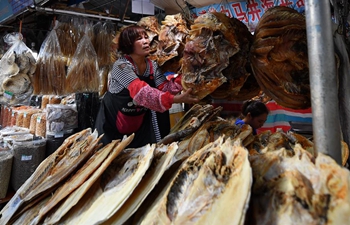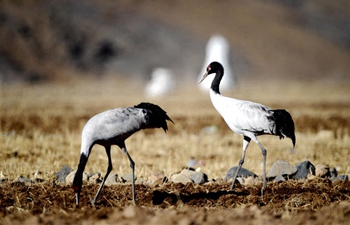ADDIS ABABA, Jan. 15 (Xinhua) -- A severe Desert Locust outbreak has threatened food security across East Africa amid greater need to exert concerted efforts to swiftly contend the pervasive outbreak, the Intergovernmental Authority on Development (IGAD), an East African bloc, said on Wednesday.
"A serious and widespread Desert Locust outbreak is destroying crops and pasture across eastern Ethiopia and neighbouring areas of Somalia, parts of Sudan, Eritrea and northern Kenya with a high risk of further spread in the absence of immediate and significant scale up in control activities," the Djibouti-based regional bloc said in a statement issued on Wednesday.
IGAD's Executive Secretary, Workneh Gebeyehu, who noted the severity of the ongoing Desert Locust outbreak in the region, also called on all IGAD member states, the East African Community and partners "to pull resources together to prevent, control and possibly eradicate the Desert Locust threat to the food security of the region."
"Prevention and control measures must be scaled up to contain further spread of the Desert Locust," the statement quoted Gebeyehu as saying, adding "countries must act urgently to avoid a food security crisis in the region."
According to IGAD, the Desert Locust "is a serious threat to the food security of the East Africa region, which is currently threatening rural livelihoods especially in Ethiopia, Somalia, Djibouti, Eritrea, Sudan and Kenya, and the risk of spread to South Sudan and Uganda is very high given the currently limited control activities, and the high mobility and reproductive potential of the Locust."
Earlier this week, the UN Food and Agriculture Organization (FAO) stressed that the ongoing Desert Locust outbreak in East Africa is the worst situation in 25 years and unusual weather and climate conditions have contributed to the spread of the invasive pest that include heavy and widespread rains since October 2019.
According to FAO, a further increase in locust swarms is likely to continue until about June 2020 due to the continuation of favourable ecological conditions for locust breeding.













